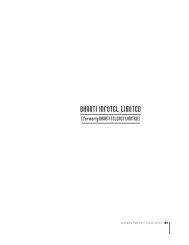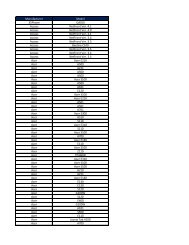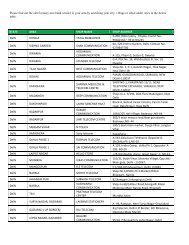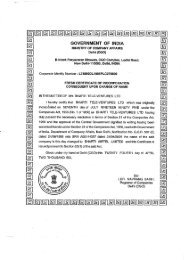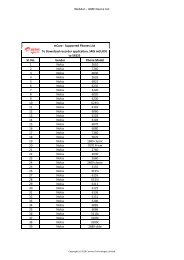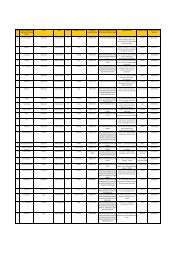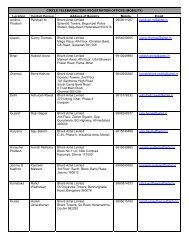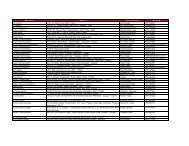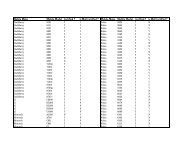You also want an ePaper? Increase the reach of your titles
YUMPU automatically turns print PDFs into web optimized ePapers that Google loves.
Unless otherwise stated below, the management<br />
believes that, based on legal advice, the outcome of<br />
these contingencies will be favorable and that a loss is<br />
not probable.<br />
c) Sales tax<br />
The claims for sales tax as at March 31, 2010 comprised<br />
the cases relating to :<br />
i. the appropriateness of the declarations made by the<br />
Company under the relevant sales tax legislations<br />
which was primarily procedural in nature;<br />
ii. the applicable sales tax on disposals of certain<br />
property and equipment items;<br />
iii. lease circuit / broadband connectivity services; and<br />
iv. the applicability of sales tax on sale of SIM cards, recharge<br />
coupons, SIM replacements, VAS, Handsets and<br />
Modem rentals.<br />
v. In the State of J&K, the Company has disputed the levy<br />
of General Sales Tax on its telecom services and<br />
towards which the Company has received a stay from<br />
the Hon'ble J&K High Court. The demands received to<br />
date have been disclosed under contingent liabilities.<br />
The Company, believes, that there would be no<br />
liability that would arise from this matter.<br />
d) Service tax<br />
The service tax demands as at March 31, 2010 relate to:<br />
i. roaming revenues charged from other operators;<br />
ii. subscriber receivables written off; and<br />
iii. cenvat claimed on tower and related material.<br />
e) Income tax demand under appeal<br />
Income tax demands under appeal mainly included the<br />
appeals filed by the Company before various appellate<br />
authorities against the disallowance of certain expenses<br />
being claimed under tax by income tax authorities and<br />
non deduction of tax at source with respect to<br />
dealers/distributor’s payments. The management believes<br />
that, based on legal advice, it is probable that its tax<br />
positions will be sustained and accordingly, recognition of<br />
a reserve for those tax positions will not be appropriate.<br />
f) Custom duty<br />
The custom authorities, in some states, demanded<br />
Rs 2,198,348 thousand as at March 31, 2010 (March 31,<br />
2009 - Rs 2,198,348 thousand) for the imports of special<br />
software on the ground that this would form part of the<br />
hardware along with which the same has been imported.<br />
The view of the Company is that such imports should not<br />
be subject to any custom duty as it would be an operating<br />
software exempt from any custom duty. The management<br />
is of the view that the probability of the claims being<br />
successful is remote.<br />
g) Entry tax<br />
In certain states an entry tax is levied on receipt of material<br />
from outside the state. This position has been challenged<br />
by the Company in the respective states, on the grounds<br />
that the specific entry tax is ultra vires the constitution.<br />
Classification issues have been raised whereby, in view of<br />
the Company, the material proposed to be taxed not<br />
covered under the specific category. The amount under<br />
dispute as at March 31, 2010 was Rs 1,956,008 thousand<br />
(March 31, 2009 - Rs 1,020,873 thousand) included in<br />
Note 3 (b) above.<br />
h) Access charges<br />
Interconnect charges are based on the Interconnect<br />
Usage Charges (IUC) agreements between the operators<br />
although the IUC rates are governed by the IUC<br />
guidelines issued by TRAI. BSNL has raised a demand<br />
requiring the Company to pay the interconnect<br />
charges at the rates contrary to the guidelines issued<br />
by TRAI. The Company filed a petition against that<br />
demand with the Telecom Disputes Settlement<br />
and Appellate Tribunal (‘TDSAT’) which passed a<br />
status quo order, stating that only the admitted amounts<br />
based on the guidelines would need to be paid by<br />
the Company.<br />
The management believes that, based on legal advice,<br />
the outcome of these contingencies will be favorable and<br />
that a loss is not probable. Accordingly, no amounts<br />
have been accrued although some have been paid<br />
under protest.<br />
i) DoT Demands<br />
i) The Company has not been able to meet its roll out<br />
obligations fully due to certain non-controllable<br />
factors like Telecommunication Engineering Center<br />
testing, Standing Advisory Committee of Radio<br />
Frequency Allocations clearance, non availability of<br />
spectrum, etc. The Company has received show cause<br />
notices from DoT for 14 of its circles for nonfulfillment<br />
of its roll out obligations. DoT has reviewed<br />
and revised the criteria now and the Company is not<br />
expecting any penalty on this account.<br />
ii) DoT demands also include demands raised for<br />
contentious matters relating to computation of<br />
license fees.<br />
j) Others<br />
Bharti <strong>Airtel</strong> Annual Report 2009-10<br />
Others mainly include disputed demands for<br />
consumption tax, disputes before consumer forum and<br />
87




